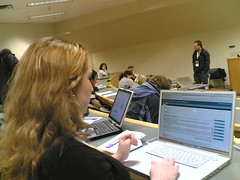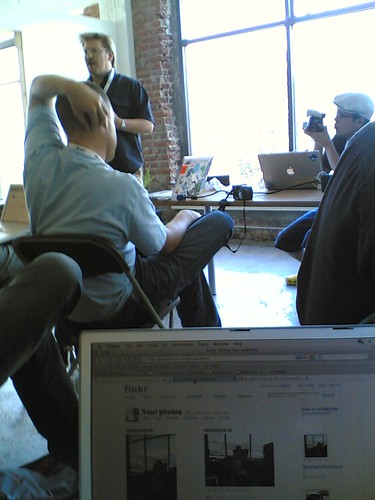I was having a conversation with a co-worker the other day about how new media and blogging interacts with today’s, traditional media. Fascinating topics for discussion, I know, but the interesting fact is that we are two people who currently work in the realms of radio broadcasting. Obviously, I’m a proponent of the medium, and the other person is one who is hesitant.
 It broke down to the way bloggers and those who read blogs will hold such truth and validity with everything that is put into the blogosphere. I had to agree that it is concerning, if not scary, how this can be true is some circumstances. However, I also reminded her that there are those people who will do nothing but rely on mainstream media, paying attention to only certain outlets. Of course, the easy examples of this would be someone who only watches FoxNews opposed to the variety of TV news outlets that are available to most cable television subscribers.
It broke down to the way bloggers and those who read blogs will hold such truth and validity with everything that is put into the blogosphere. I had to agree that it is concerning, if not scary, how this can be true is some circumstances. However, I also reminded her that there are those people who will do nothing but rely on mainstream media, paying attention to only certain outlets. Of course, the easy examples of this would be someone who only watches FoxNews opposed to the variety of TV news outlets that are available to most cable television subscribers.
They had a tough time disputing that, so I broke down my thought on this premise even further. I explained how it should be our job, as bloggers, to instill an element of checks and balances upon traditional media so that many viewpoints and aspects to a story can be examined, if not built upon.
Rebecca wrote about a post a few weeks ago about an article by Chris McCosky of The Detroit News when he said, “Bloggers just aren’t journalists“.
Bloggers and personal, non-journalistic Web sites are starting to tick me off. Look, I appreciate and respect that in America, everybody has an opinion, especially on sports. And I respect everybody’s right to share their thoughts with anybody who happens to own a computer via blogs.
But people, let’s not confuse what random fans and wanna-be pundits are tossing out there with legitimate reporting. The line is getting way too blurry now between Internet noise and actual journalism. It’s actually getting to the point now where some (too many) of the bloggers are using cyberspace to discredit the legitimate media.
Now I am not saying all legitimate media or every reporter is 100 percent credible. Nor am I saying every blogger is out to discredit legitimate media. But the distinction between the two must be clearer.
Journalism employs trained professionals. We actually have to go to school for this stuff. We take our jobs seriously. There are rules and standards that we are beholden to. There are ethics involved. We actually talk to, in person, the people we write about. [detnews]
 For the record, I’ve studied a little bit in the ways of journalism school, and there are elements from that schooling that I maintain today. However, I’ve known people who have walked away with journalism degrees that whole heartedly scare me as to their journalistic integrity and the ability to do their jobs respectably. That doesn’t make me an expert, but it certainly gives me reason to question those who have the duty of telling me everything it is that I need to know.
For the record, I’ve studied a little bit in the ways of journalism school, and there are elements from that schooling that I maintain today. However, I’ve known people who have walked away with journalism degrees that whole heartedly scare me as to their journalistic integrity and the ability to do their jobs respectably. That doesn’t make me an expert, but it certainly gives me reason to question those who have the duty of telling me everything it is that I need to know.
I take my news from a variety of mainstream media sources, such as, but not limited to, the BBC, CNN, Guardian, Reuters, AP, New York Times, and, yes, even FoxNews. I like to see stories from multiple angles and derive my own conclusions, not just what “trained journalists” are trained, and told by their editors, to report on.
I’m also familiar with the structure that certain journalists use to report the news. There is your standard formula with the way you structure your intro, presented a certain set of information to setup your story. After that, you have to get your quote from someone close to the story. Toss in a deadline to a reporter and the number of people in the pool to get that needed quote gets a little slim. After that, there’s the extra back story at the tail end to give insight and let you know if there is more to tune into for next week.
Certainly there is need for delicate training for how one refines themselves to achieve this mastery, and I say that non-mockingly. However, in this era of big media where less means more, the small amount of journalists out there have a very large world to cover.
After that, blogs offer something deeper than the facts and figures of a story. They bring out qualitative information, as well as the quantitative, that provide various viewpoints that a journalist might not be able to provide. On top of that, bloggers can serve as way to watch journalists to make sure they are doing a worthwhile job in their reporting.
As a blogger, I am a source, but I’m hardly the source. Journalists are exactly the same thing. If you argue your viewpoint on an event, you have to consider where you got your information. it’s no different than a game of telephone where the facts and details can change as they are relayed and published.
Trust me, I’ve been there and seen it so many times on a personal level. Last spring when The Crazy Canucks got a lot of press coverage, the information that I would provide to journalists were stretched or mistaken for half-truths or something completely opposite. It’s human nature to make errors, and I believe that as a collective group, feedback can help put the information back together into something that is much more factual than what a very select, few people can tell you.
It’s not as much about discredit as it is making sure that what is said is a valid statement. Even more so, it’s about having a voice, and I’ll be damned if I or anyone should have to go to school to be able to have that.











